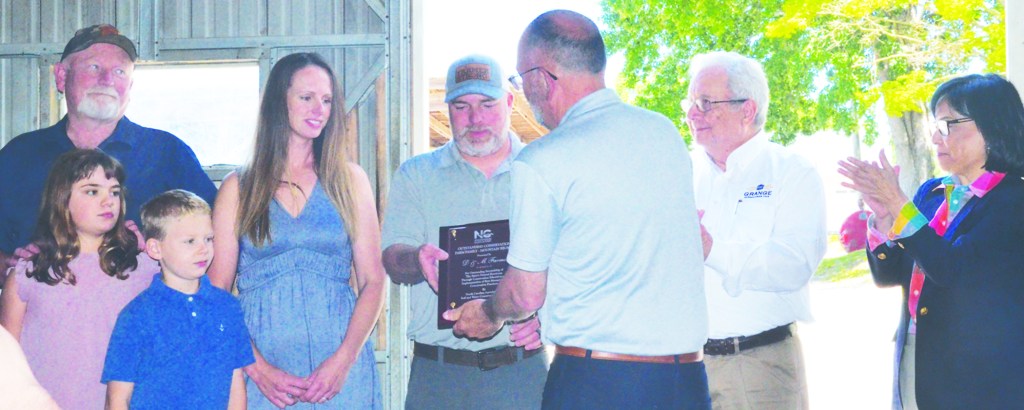Taking care of the land: Davie family top farm conservationists in the state
Published 10:44 am Tuesday, June 3, 2025

- The D&M Farms on Calahaln family, from left, Tommy Dyson, Allie Myers, Bradley Myers, Jessica Myers and Craig Myers, accept the NC Outstanding Conservation Farm Family of the Year award from state executive director Bryan Evans. - Photo by Mike Barnhardt
|
Getting your Trinity Audio player ready...
|
By Mike Barnhardt
Enterprise Record
CALAHALN – It’s all about family, faith and hard work.
Tommy Dyson believes in all three. So does his daughter, Jessica Myers, and her husband and children, Craig, Allie and Bradley.
Together, they have grown D&M Farms on Calahaln into one of the most respected farm enterprises in the state. Last month, they hosted N.C. Agriculture Commissioner Steve Troxler and soil and water conservation officials from across the state, to celebrate D&M as being the North Carolina Soil & Water Conservation Districts Farm Family of the Year.
Troxler praised the family for teaching future generations of farmers, and for taking care of the land that has been in the family since the 1950s.
D&M has some 55,000 roosters and hens, producing hatchling eggs for Perdue. They also raise beef cows and pigs, and sell products from both. Children Allie and Bradley have their own “tallow” business, selling skin products. They also tend acres and acres of field crops.
Tommy Dyson looked over the crowd at the celebration with pride. His father, Leroy Dyson, bought the farm in the 1950s. The family then mostly raised dairy cows and tobacco. They milked the last dairy cow in 1994, and the tobacco acreage dwindled.
Tommy had worked mostly as a part-time farmer during his life, working a public job, as well. Then Craig, his son-in-law, came up with the idea to team up with Perdue to bring the farm back to life.
It was a big financial investment and risk, but they took the plunge.
And it’s working out just fine.
Tommy learned early on the importance of taking care of the land. “It’s very important because it takes Mother Nature a long time to make an inch of topsoil.”
Conservation practices on the farm include:
• dry stack removal of chicken litter from the houses, which is later used as fertilizer on theirs and other farms;
• grassed waterways to prevent erosion between fields;
• conversion of cropland to grass, which can still be used for hay production or as a pasture;
• heavy use area protection, which adds a layer to prevent erosion and keep the cattle in a cleaner and safer environment, as well as making it easier to maneuver equipment around the farm;
• 25 acres is dedicated for forestry management to hold the soil in place, prevent runoff into a tributary and to provide wildlife habitat.
Troxler cited numbers that North Carolina is losing farm land faster than every state beside Texas. His office is doing what it can to help slow that trend, he said.
“Farming now is about the future. We’re trying to keep farms in North Carolina in production.”
He farmed in Guilford, and since retiring, has seen Greensboro’s growth take over some of the soil he used to tend. “I operated 12 farms and put soil and water practices on all of them,” he said. “It just made sense. It made them more productive and sustainable for the future.”
Despite the negative, Troxler sees good things for North Carolina farmers.
“We have a bright future … as long as people eat,” he said. “There’s always going to be a demand for our products. And it all starts with a farm and a family.”
“Farming is more than an industry, it’s a way of life passed down through generations,” said Amanda Raymond, speaking on behalf of Lt. Gov. Rachel Hunt. “Land management and productive agriculture go hand in hand.”
Brad Langston read a letter from U.S. Congressman Addison McDowell, which said, in part: “You’re setting a great example for family farms across the country. Thank you for keeping the agriculture tradition strong on North Carolina.”
“We’re super grateful for folks like Craig and Jessica and their family,” said Kevin Marion, a member of the Davie Soil & Water Conversation District.
Bryan Evans, executive director of the NC Association of Soil & Water Conservation Districts, said he looks forward to seeing the future at D&M Farms. “We believe the best conservationists are farmers. D&M Farms is actively cultivating the fourth generation of farmers, with an emphasis on family and community.”
Craig Myers thanked the officials for the honor, but kept his top praise for his family.
“This is a reflection of our family’s faith, hard work and commitment we’ve put into this farm. To run a farm like this, it takes a team.”
D&M Farms has kept the same two employees since its inception.
He thanked his wife (the children are home schooled) for keeping the family together and allowing him to chase his dream.
He talked about the pride his has for his children and how they, too, are an important part of the work done on the farm, especially their willingness to embrace the philosophy of family, faith and hard work.
He thanked his father-in-law, who leads by example and taught him how to face the hard days.
It’s summed up in the farm’s mission statement.
“Our mission is to cultivate high-quality agricultural products that honor our family’s legacy while promoting sustainable farming practices. Family is at the heart of everything we do, and we are committed to enhancing soil health and biodiversity. We want to inspire others and be an example others will look up to, demonstrating strong family values and responsible stewardship of the land. Our goal is to inspire others to embrace practices that benefit the land and the community, ensuring a future where the land is respected and appreciated by all.”




